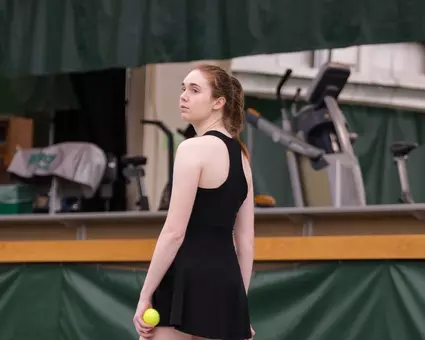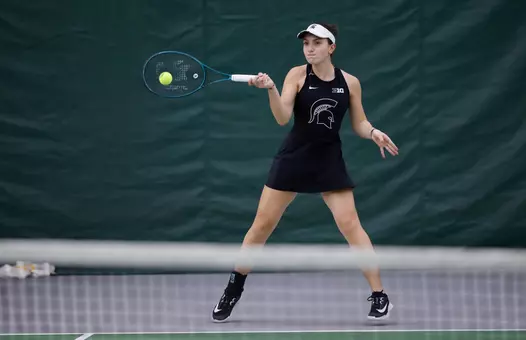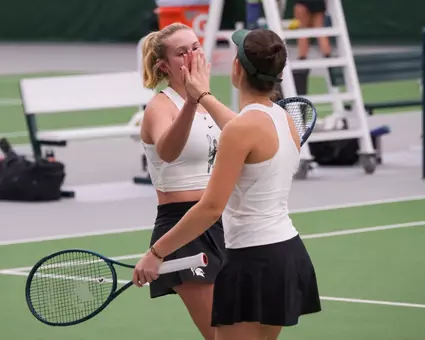Michigan State University Athletics

Photo by: Matthew Mitchell/MSU Athletic Communications
Pair Of European Newcomers Adapting To Life As Spartans
11/14/2025 2:02:00 PM | Women's Tennis
MSU women’s tennis duo adjusting to student-athlete life.
EAST LANSING, Mich. -- Two tennis players from Europe came to Michigan State in search of opportunity and found a community that makes the distance feel smaller.
Spartans women's tennis newcomers Nina Plihal, who hails from Klagenfurt, Austria, and Anna Maria Tottrup, from Tallinn, Estonia, arrived this fall facing the same challenge: adjusting to college tennis and life in America.
The move has meant finding their footing in a new country and adapting to a different competitive system, all while learning to balance academics, tennis and daily life.
Plihal, a sophomore kinesiology major, who began her studies in Austria, arrived in East Lansing after a decorated junior tennis career in her home country. She won more than 30 tournaments, including national singles and doubles championships.
Tottrup, a freshman economics major, came to MSU as a former national doubles champion and one of Estonia's top-ranked juniors.
They have varied backgrounds, but made a similar decision, both leaving home for a chance to grow their games and experience something new.
"I think I will grow as a person because I've seen the other part of the world, and a lot of people don't have this opportunity to study abroad," Plihal said.
MSU women's tennis head coach Kim Bruno said the two have approached the transition with maturity, joining a roster that reaches well beyond the U.S., with seven of nine players from overseas.
"They've come in and really bought into what we do here, and immediately immersed themselves in their teammates," Bruno said. "They've been like one of the gang for, it feels like four years, when it's only been a month or something."
Their paths to East Lansing were distinct from the start.
It happened fast for Plihal. She was in touch with several programs but never had time to visit. MSU was her last call, one that gave her "a really good gut feeling." A second call with the staff came the next day.
"That was the time when I decided I wanted to go to MSU because I also saw a lot of videos of the campus, and it just looked incredible," Plihal said.
When she arrived in August, visiting the campus for the first time with her father, that instinct was confirmed.
"The facility is great, my apartment is great, my roommates are incredible," Plihal said. "I couldn't be happier with them."
Tottrup spent more than two years navigating the recruiting process, visiting several other schools including Michigan, Arkansas and Iowa State before choosing the Spartans. She visited East Lansing for the first time in November, 2024 and said MSU stood out because the coaches were unique, more personal and more genuine.
"I just felt my tennis would grow the most here because I felt like they believed in me and could see my potential, which I think some of the coaches just didn't see," Tottrup said.
Once they arrived, the shared experience of starting over gave them common ground. Both were thousands of miles from home, learning new routines and expectations. Plihal, an extrovert, said her teammates and roommates quickly became her support system.
"The transition wasn't that bad because everybody is so nice," Plihal said.
Tottrup, raised in a more reserved manner, felt the difference right away.
"It was definitely a culture shock," Tottrup said. "In Estonia, people are really quiet and not really outgoing. But here, strangers come up and say hi, like, really kind."
As their semester has gone on, both players have learned what it means to balance their worlds: the independence of college life with the discipline and rigor of Big Ten tennis. Days start early and end late, built around training, class, practice and recovery.
It's a grind that can overwhelm first-year players, but both have managed it with focus, Bruno said.
The structure isn't completely new to Plihal. She studied while competing in Austria, where training was smaller and more individualized. At MSU, she's had to recalibrate to a larger team environment and the pace of a synchronized schedule: nine players working, rotating, pushing together.
The change has been about pace and scale for Tottrup. It's her first time living in America, and the world around college sports moves faster than anything she knew in Estonia. Training at MSU is louder, more collective; back home, it was quieter and more individual. That difference has pushed her forward socially. She's naturally not the first to step out, but she's made friends quickly, and she's more outgoing than most Estonians, she said.
Teammates and coaches have been central to that acclimation, and Tottrup leans on them while staying close to family with frequent calls across a seven-hour time difference. What's kept her grounded is the sense of a joint mission, that everyone around her is chasing the same goal.
"Everyone is taking such good care of me. The coaches, teammates, everyone's here for me," Tottrup said. "I feel like this is my home. This is where I belong."
Plihal laughs about navigating the eating scene.
"The food's much different here," she said with a giggle, one of the few adjustments she's still figuring out.
On the court, though, Plihal and Tottrup have adapted fast. The tempo of American hard courts is sharper and quicker than the slower clay they grew up on in Europe, a shift that's demanded swift thinking and a more assertive technique, Bruno said.
That physical change in style was just part of what brought Plihal and Tottrup to East Lansing, a chance to grow personally and athletically, to see a different part of the world and learn from it in ways few players ever get to.
They came for the competition and stayed for the feeling that, halfway around the globe, they've found a program that feels like home.
"I don't think you can get two nicer girls who are all about being here, no matter being all the way across the world," Bruno said. "They're super grateful for it, too. They just show up and do their stuff."
While Plihal, Tottrup and MSU's fall action has concluded, they'll be back on the courts in the spring ready to lend their European touch to the Spartans' success.
Spartans women's tennis newcomers Nina Plihal, who hails from Klagenfurt, Austria, and Anna Maria Tottrup, from Tallinn, Estonia, arrived this fall facing the same challenge: adjusting to college tennis and life in America.
The move has meant finding their footing in a new country and adapting to a different competitive system, all while learning to balance academics, tennis and daily life.
Plihal, a sophomore kinesiology major, who began her studies in Austria, arrived in East Lansing after a decorated junior tennis career in her home country. She won more than 30 tournaments, including national singles and doubles championships.
Tottrup, a freshman economics major, came to MSU as a former national doubles champion and one of Estonia's top-ranked juniors.
They have varied backgrounds, but made a similar decision, both leaving home for a chance to grow their games and experience something new.
"I think I will grow as a person because I've seen the other part of the world, and a lot of people don't have this opportunity to study abroad," Plihal said.
MSU women's tennis head coach Kim Bruno said the two have approached the transition with maturity, joining a roster that reaches well beyond the U.S., with seven of nine players from overseas.
"They've come in and really bought into what we do here, and immediately immersed themselves in their teammates," Bruno said. "They've been like one of the gang for, it feels like four years, when it's only been a month or something."
Their paths to East Lansing were distinct from the start.
It happened fast for Plihal. She was in touch with several programs but never had time to visit. MSU was her last call, one that gave her "a really good gut feeling." A second call with the staff came the next day.
"That was the time when I decided I wanted to go to MSU because I also saw a lot of videos of the campus, and it just looked incredible," Plihal said.
When she arrived in August, visiting the campus for the first time with her father, that instinct was confirmed.
"The facility is great, my apartment is great, my roommates are incredible," Plihal said. "I couldn't be happier with them."
Tottrup spent more than two years navigating the recruiting process, visiting several other schools including Michigan, Arkansas and Iowa State before choosing the Spartans. She visited East Lansing for the first time in November, 2024 and said MSU stood out because the coaches were unique, more personal and more genuine.
"I just felt my tennis would grow the most here because I felt like they believed in me and could see my potential, which I think some of the coaches just didn't see," Tottrup said.
Once they arrived, the shared experience of starting over gave them common ground. Both were thousands of miles from home, learning new routines and expectations. Plihal, an extrovert, said her teammates and roommates quickly became her support system.
"The transition wasn't that bad because everybody is so nice," Plihal said.
Tottrup, raised in a more reserved manner, felt the difference right away.
"It was definitely a culture shock," Tottrup said. "In Estonia, people are really quiet and not really outgoing. But here, strangers come up and say hi, like, really kind."
As their semester has gone on, both players have learned what it means to balance their worlds: the independence of college life with the discipline and rigor of Big Ten tennis. Days start early and end late, built around training, class, practice and recovery.
It's a grind that can overwhelm first-year players, but both have managed it with focus, Bruno said.
The structure isn't completely new to Plihal. She studied while competing in Austria, where training was smaller and more individualized. At MSU, she's had to recalibrate to a larger team environment and the pace of a synchronized schedule: nine players working, rotating, pushing together.
The change has been about pace and scale for Tottrup. It's her first time living in America, and the world around college sports moves faster than anything she knew in Estonia. Training at MSU is louder, more collective; back home, it was quieter and more individual. That difference has pushed her forward socially. She's naturally not the first to step out, but she's made friends quickly, and she's more outgoing than most Estonians, she said.
Teammates and coaches have been central to that acclimation, and Tottrup leans on them while staying close to family with frequent calls across a seven-hour time difference. What's kept her grounded is the sense of a joint mission, that everyone around her is chasing the same goal.
"Everyone is taking such good care of me. The coaches, teammates, everyone's here for me," Tottrup said. "I feel like this is my home. This is where I belong."
Plihal laughs about navigating the eating scene.
"The food's much different here," she said with a giggle, one of the few adjustments she's still figuring out.
On the court, though, Plihal and Tottrup have adapted fast. The tempo of American hard courts is sharper and quicker than the slower clay they grew up on in Europe, a shift that's demanded swift thinking and a more assertive technique, Bruno said.
That physical change in style was just part of what brought Plihal and Tottrup to East Lansing, a chance to grow personally and athletically, to see a different part of the world and learn from it in ways few players ever get to.
They came for the competition and stayed for the feeling that, halfway around the globe, they've found a program that feels like home.
"I don't think you can get two nicer girls who are all about being here, no matter being all the way across the world," Bruno said. "They're super grateful for it, too. They just show up and do their stuff."
While Plihal, Tottrup and MSU's fall action has concluded, they'll be back on the courts in the spring ready to lend their European touch to the Spartans' success.
Players Mentioned
Liisa Vehviläinen | The Way of Sisu | Spartans All-Access
Thursday, February 20
Kim Bruno | Women's Tennis Press Conference | Feb. 17 2025
Monday, February 17
Kim Bruno | Women's Tennis Press Conference | Jan. 28 2025
Tuesday, January 28
Spartans All-Access: Marlo Schiffman
Wednesday, April 03






